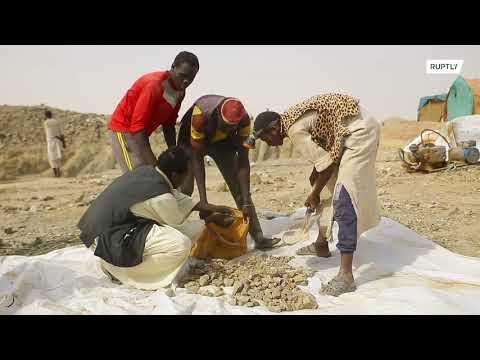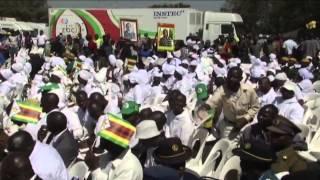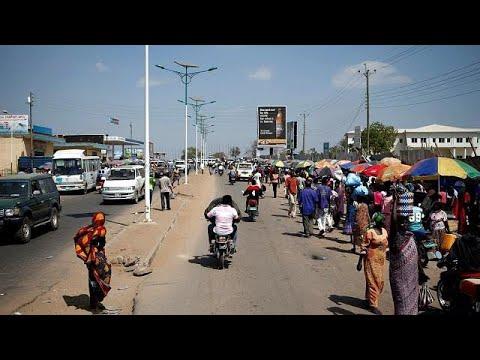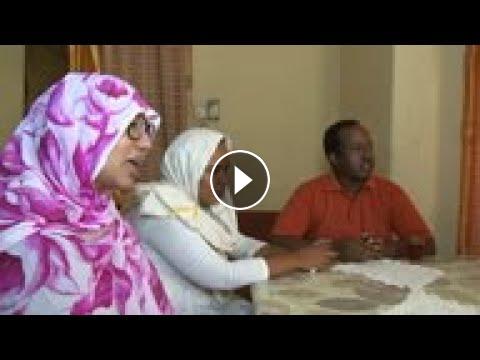Their Jewish name is no longer a mark of shame for a Sudanese family living in Omdurman.
STORY-LINE:
Mansour Ishaq Israel's ancestors were Jewish immigrants to Sudan, traders who brought their wealth to trade and work in the African country.
His grandfather came to the country from Iraq.
He says most of the family converted to Islam not long after they arrived, and quickly assimilated.
He and his three children know no other home than Sudan.
But their name has long been a mark of otherness in the largely conservative Muslim Sudan.
Now, the name Israel is becoming less of a taboo.
In recent weeks Sudan has said it is growing closer to normalising ties with the country of Israel after decades of enmity.
"We are more comfortable now, after the Sudanese mindset has changed. We were suffering from the general attitude before," says Israel's daughter Shams.
She says things have changed since the popular uprising last year.
Under Sudan's former longtime dictator Omar al-Bashir, the country had a very hostile stance towards Israel and to a large degree, Jewishness.
"We were among the wealthiest, and now we are among the poorest," says Israel.
"The former regime... attacked our family's legacy," he adds.
Today, he owns a pharmacy in an area still known as Omdurman's "Jewish Quarter".
Many of Sudan's Jews had immigrated to the country at the turn of the 19th century from North Africa and other Arab countries, and the community founded a synagogue in 1889.
The community, which is thought to have numbered nearly 1,000 at its height in the 1950s, began leaving not long after the country gained independence from Britain in 1956.
Those who remained faced increasing intimidation and disenfranchisement.
Countries across the Middle East expelled Jews following the founding of Israel in 1948 and the succession of wars fought between it and its Arab neighbours.
Israel's family survived by assimilating and not calling attention to themselves.
But there are still decades of hostility to undo.
Sudan hosted the landmark Arab conference after the 1967 Mideast war where eight Arab countries approved the "three no's": no peace with Israel, no recognition of Israel and no negotiations.
Anti-Israel sentiment increased under Bashir, who rose to power in a 1989 coup.
In 1993, the U.S. designated Sudan a state sponsor of terrorism in part for its support of a number of anti-Israel militant groups, including Hamas and Hezbollah.
During all this time, Israel's family kept a low profile, fearful that their name could provoke attention or worse, attacks.
But since Bashir's removal, they hope things might improve even more.
Find out more about AP Archive: http://www.aparchive.com/HowWeWork
Twitter: https://twitter.com/AP_Archive
Facebook: https://www.facebook.com/APArchives
Google+: https://plus.google.com/b/102011028589719587178/+APArchive
Tumblr: https://aparchives.tumblr.com/
Instagram: https://www.instagram.com/APNews/
You can license this story through AP Archive: http://www.aparchive.com/metadata/youtube/41b6444e0a574bf28bb2d90d3d6a1900
STORY-LINE:
Mansour Ishaq Israel's ancestors were Jewish immigrants to Sudan, traders who brought their wealth to trade and work in the African country.
His grandfather came to the country from Iraq.
He says most of the family converted to Islam not long after they arrived, and quickly assimilated.
He and his three children know no other home than Sudan.
But their name has long been a mark of otherness in the largely conservative Muslim Sudan.
Now, the name Israel is becoming less of a taboo.
In recent weeks Sudan has said it is growing closer to normalising ties with the country of Israel after decades of enmity.
"We are more comfortable now, after the Sudanese mindset has changed. We were suffering from the general attitude before," says Israel's daughter Shams.
She says things have changed since the popular uprising last year.
Under Sudan's former longtime dictator Omar al-Bashir, the country had a very hostile stance towards Israel and to a large degree, Jewishness.
"We were among the wealthiest, and now we are among the poorest," says Israel.
"The former regime... attacked our family's legacy," he adds.
Today, he owns a pharmacy in an area still known as Omdurman's "Jewish Quarter".
Many of Sudan's Jews had immigrated to the country at the turn of the 19th century from North Africa and other Arab countries, and the community founded a synagogue in 1889.
The community, which is thought to have numbered nearly 1,000 at its height in the 1950s, began leaving not long after the country gained independence from Britain in 1956.
Those who remained faced increasing intimidation and disenfranchisement.
Countries across the Middle East expelled Jews following the founding of Israel in 1948 and the succession of wars fought between it and its Arab neighbours.
Israel's family survived by assimilating and not calling attention to themselves.
But there are still decades of hostility to undo.
Sudan hosted the landmark Arab conference after the 1967 Mideast war where eight Arab countries approved the "three no's": no peace with Israel, no recognition of Israel and no negotiations.
Anti-Israel sentiment increased under Bashir, who rose to power in a 1989 coup.
In 1993, the U.S. designated Sudan a state sponsor of terrorism in part for its support of a number of anti-Israel militant groups, including Hamas and Hezbollah.
During all this time, Israel's family kept a low profile, fearful that their name could provoke attention or worse, attacks.
But since Bashir's removal, they hope things might improve even more.
Find out more about AP Archive: http://www.aparchive.com/HowWeWork
Twitter: https://twitter.com/AP_Archive
Facebook: https://www.facebook.com/APArchives
Google+: https://plus.google.com/b/102011028589719587178/+APArchive
Tumblr: https://aparchives.tumblr.com/
Instagram: https://www.instagram.com/APNews/
You can license this story through AP Archive: http://www.aparchive.com/metadata/youtube/41b6444e0a574bf28bb2d90d3d6a1900
Be the first to comment









